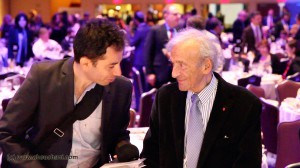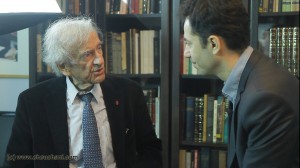En attendant le film tant attendu sur Monsieur Chouchani, le réalisateur Michael Grynszpan continue son enquête sur les traces du mystérieux Monsieur Chouchani. Après avoir rencontré des centaines de témoins à travers le monde, dont Elie Wiesel à New York, et fait des découvertes fabuleuses, il souhaitait entendre la vision des artistes qui avaient travaillé sur le mythe Chouchani. Voici en exclusivité un petit reportage sur sa rencontre avec Gérard Garouste, un artiste contemporain majeur, qui a réalisé plusieurs travaux sur Monsieur Chouchani. Il aime faire se rencontrer dans ses oeuvres Franz Kafka, Borges ou Levinas avec Chouchani. Ces tableaux sont exposés à la Galerie Templon Paris.
Tag Archives: shushani
Shushani at the Museum of the Jewish People
Monsieur Chouchani in the new Museum of the Jewish People in Tel Aviv. It’s amazing. At last! A few years ago he was totally unknown in Israel. The artist who made this painting may not even know that according to many witnesses Chouchani was never seen holding a book in his hands.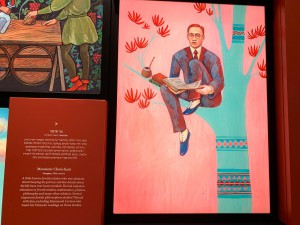
מר שושני במוזאון העם היהודי החדש בתל אביב. זה מדהים! הגיע הזמן… לפני כמה שנים הוא לא היה מוכר בכלל. האמן שצייר אותו כאן כנראה לא יודע שלפי עדים רבים לעולם לא ראו את מר שושני מחזיק או קורא ספר.
The world is missing Elie Wiesel
כ”ו בסיוון הוא היארצייט הרביעי של אלי ויזל זל, איש דגול במיוחד. אנחנו מתגעגעים אליו, והוא חסר לעולם. הוא תרם כל כך בזכות קומתו המוסרית, כישרונו הספרותית, המסר ההומניסטי שלו, וגם הרוחניות היהודית שלו. הייתה לי הזכות לפגוש ולראיין אותו על המורה המסתורי שלו. עשיית סרט או כתיבה על מר שושני מבלי לראיין את אלי ויזל תמיד נראתה לי לא מתקבלת על הדעת. זה היה נראה כמו העיתונאים האלה שכותבים מאמרים על ספרים שלא קראו או על מדינות בהן מעולם לא דרכו … אלי ויזל בהחלט כתב ופרסם הרבה על מר שושני, אך הוא עדיין שמר הרבה סודות. כשנפגשנו הוא נתן לי כמה. הוא הודה בפני כולם שהוא לא היה הופך לאיש שהוא היה ללא המפגש שלו עם שושני… זוכה פרס נובל שכל חייו נלהב מוונד אלמוני; זה סיפור אמיתי ויוצא דופן. יהי זכרו ברוך!
Ce soir et demain (18 juin 2020) sera le 4ème Yartzeit (anniversaire de la mort selon le calendrier hébraique) du grand Elie Wiesel zal. Il manque au monde par sa stature morale, par son talent d’écrivain et par son message humaniste et de spiritualité juive. J’ai eu la chance de le rencontrer et de l’interviewer au sujet de son Maitre mystérieux. Faire un film ou écrire sur Monsieur Chouchani sans avoir interviewé Elie Wiesel m’a toujours semblé inimaginable. Ce serait un peu comme ces journalistes qui écrivent des articles sur des livres qu’ils n’ont pas lus ou sur des pays dans lesquels ils n’ont jamais mis les pieds… Elie Wiesel a certes beaucoup écrit et publié sur Monsieur Chouchani, mais il gardait encore bien des secrets. Il m’en a confié quelques uns. Il avouait à tous qu’il n’aurait pas été l’homme qu’il est devenu sans cette rencontre avec Chouchani… Un prix Nobel toute sa vie fasciné par un vagabond ; une histoire vraie et exceptionnelle. Que sa mémoire soit bénie !
About Chouchani in the Vatican
A new article about Monsieur Chouchani in a Vatican’s newspaper! Yes even in the Vatican, they are interested in this exceptional man. They also write there about our movie and the filmmaker Michael Grynszpan.
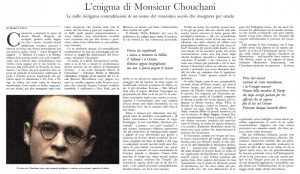
מאמר חדש בעיתון בוותיקן! כן גם בוותיקן הם מתעניינים באיש היצא דופן הזה. הם גם מזכירים שם את הסרט שלנו ואת הבמאי מיכאל גרינשפן.
https://www.vaticannews.va/it/osservatoreromano/news/2020-05/l-enigma-di-monsieur-chouchani.html
Chouchani and the epidemic
Monsieur Chouchani (or Shushani) and the epidemic
מר שושני והמגפה
Monsieur Chouchani was a mysterious genius. The mentor of Elie Wiesel and Emmanuel Levinas. Can we learn something from his bizarre hygiene habits? Excerpts from the film which is in the process. Visit our page www.chouchani.com and join our journey.
מר שושני היה גאון מסתורי, האב הרוחני של אלי ויזל, עמנואל לוינס ורבים אחרים. האם ניתן ללמוד מהרגלי ההיגיינה המוזרים שלו? הינה קטע מהסרט של מיכאל גרינשפן על מר שושני שייצא בקרוב. שתפו
Interview de Michael Grynszpan sur Monsieur Chouchani – au micro d’Olivier Granilic
« Monsieur Chouchani éveille de plus en plus de curiosité », Michael Grynszpan parlait, au micro d’Olivier Granilic, de son film sur ce génie mystérieux et de la vente aux enchères des manuscrits de ce dernier.
The First book of young Elie Wiesel was inspired by his Master Shushani
The first book of young Elie Wiesel, never published, was finally found. This book deals with asceticism and was directly influenced by his master Shushani (or Monsieur Chouchani in French).
The myster.
“Shushani” – wrote Wiesel in his book (“All Rivers Run to the Sea,” page 150) “led me surreptitiously to a subject that had always fascinated me: asceticism, the lure and quest for suffering, the will to suffer so as to infuse one’s own suffering and that of others with meaning. We talked of the ascetic and his self, enriched or mutilated by suffering, the relation between suffering and truth, suffering and redemption, suffering and spiritual purity, suffering as a gateway to the sacred, the prophetic, rabbinical, mystical point of view. Was it necessary, even indispensable, to punish the body in order to allow the soul to soar to new heights? Why was the nazir (ascetic) considered a sinner in Scripture? Why was he compelled to bring a sacrifice to the Temple? How to understand the variety of ascetics?” (p. 150).
Read more here: https://www.jpost.com/Jerusalem-Report/Elie-Wiesels-first-book-574677?fbclid=IwAR0ZUcY-f89uaF4wLw4qJeq9asyTdttiQZS8qoVUolaOot10hireqFCDM_0
Le mystérieux Maître d’Elie Wiesel – article sur les rapports Chouchani-Wiesel
“Shushani and the Problem of Humiliation”
“Shushani and the Problem of Humiliation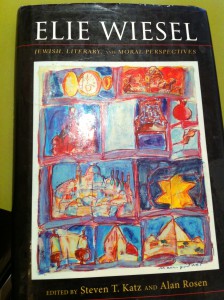
Not every teacher thus honored performed their task with equanimity of spirit. Many were angry, some morose. But Mordechai Rosenbaum (aka Harav Mordechai Shushani) presents a special case. His brilliance, erudition, and devotion to study are legendary, as experienced by Wiesel, Emmanuel Levinas, Shalom Rosenberg, and other members of an elite group of students. He was eccentric in appearance, behavior, and method, dressing poorly, maintaining secrecy in his comings and goings, saying little about his past, and holding marathon classes some days and disappearing for long stretches on others. (…) Wiesel also characterizes Harav Shushani as rude and abrupt, stooping so low as to mock, humiliate, and and torment his students. (…)
Harav Shushani did everything, in other words, that his student wouldn’t think of doing. Wiesel’s way is not to humiliate but to humanize.
Indeed, the relationship between Rav Shushani and his admiring student – humiliation on the one hand, loyalty on the other – replays how Wiesel some years later described the relationship between the renegade talmudic master, Elisha ben Abuya, and his lone remaining disciple, Rabbi Meir.(…) Wiesel never refers to Shushani as an apostate (though others apparently did). The question was more the effect of his teaching on the faith of others rather than on his own. Nevertheless, what thy shared was a pedagogy that had room for the humiliation of their closest disciples.
What then did our teacher learn from his own about teaching ? Perhaps he learned what NOT to do; perhaps WE learn, indirectly and paradoxically, that sometimes one chooses a master (or a master chooses a student) from whom one eventually diverges 180 degrees. But then again, it may be that Wiesel’s classroom teaching draws on Shushani’s, while filtering away its excesses.”
from ELIE WIESEL Jewish, Literary and Moral Perspectives. Alan Rosen.
Elie Wiesel-Chouchani’s relationship and influence.
Interesting article on Elie Wiesel-Chouchani’s relationship and influence.
“Shushani’s influence on Wiesel cannot be overstated. “It is to him I owe my constant drive to question, my pursuit of the mystery that lies within knowledge and of the darkness hidden within light.” “(…)
“What, then, was the turning point in Wiesel’s life that led to his writing of Night?–and to a remarkable career of bearing witness to the Holocaust and to speaking out on behalf of all who suffer from oppression and injustice? Arguably, it was his unsettling initial experience with the wise teacher Shushani.
From Shushani he learned about Job, Midrash, the Talmud, and humanity. From Shushani he learned to question certainties, to care deeply about the suffering of others, and to acknowledge the power (and limitation) of words. Eventually, and above all, these lessons led Wiesel to a sense of responsibility, of personal moral accountability in the face of oppression and suffering.
From Shushani Wiesel learned that “Man is defined by what troubles him, not by what reassures him.” He learned that despite the limitation of words, he had to make his deposition.”
http://www.freepatentsonline.com/article/Cross-Currents/174012201.html
